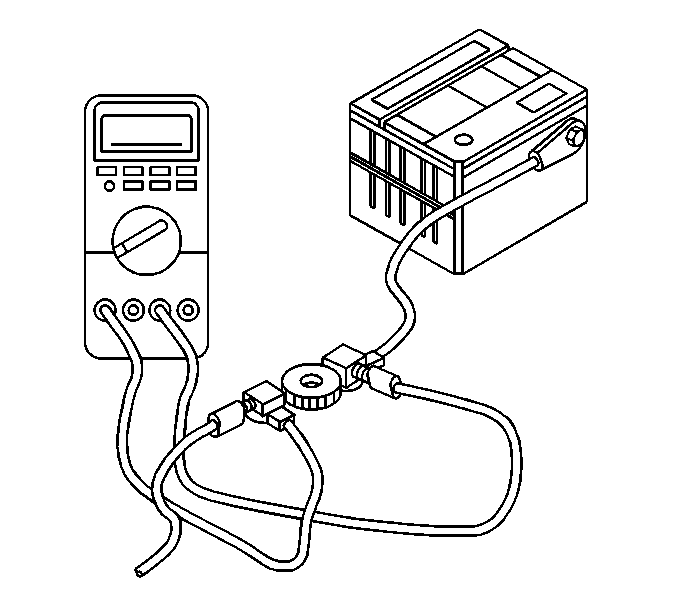Tools Required
| • | J 38758 Parasitic Draw Test Switch Tool |
| • | J 39200 Digital Multimeter |
Notice: Do not turn the parasitic draw test switch to the OFF position with the engine running. Damage will occur to the vehicle's electrical system.
Notice: The test switch must be in the ON position when removing the fuses in order to maintain continuity in the electrical system. This avoids damaging the digital multimeter due to accidental overloading, such as a door being opened to change a fuse.
If a vehicle exhibits a low or dead battery after sitting overnight or discharges over a period of two or three days, the electrical system should be checked for an excessive electrical drain. This condition is referred to as parasitic load drain. To properly diagnose this condition, perform the Parasitic Load Test.
- Turn the ignition to LOCK.
- Charge the battery to a full state of charge. Refer to Battery Charging .
- Disconnect the negative (-) battery cable.
- Turn the J 38758 knob to the OFF position.
- Connect the J 38758 between the battery and the negative battery cable.
- Turn the J 38758 knob to the ON position.
- Road test the vehicle and activate all of the accessories, including the radio and the air conditioning.
- Park the vehicle. Turn the ignition switch to the OFF position and remove the ignition key.
- Set the J 39200 to the 10 amp scale.
- Connect the J 39200 to the test switch tool terminals.
- Turn the J 38758 knob to the OFF position. The current now flows through the digital multimeter.
- Measure the parasitic load draw (in amperes) with all doors closed and the ignition key removed from the ignition switch.
- If a parasitic load drain over 0.5 amperes is present, isolate the electrical system, circuit or component at fault by removing the fuses one at a time. Refer to Fuse Block Schematics .
- If a parasitic load drain over 0.5 amperes is still present, check the generator, the starter motor, the starter solenoid and the related wiring for short circuits. Refer to Starting and Charging Schematics .
- If a parasitic load drain less than 0.5 amperes is present, set the J 39200 selector switch to Milliamp/Microamp Input Terminal scale.
- Measure the parasitic load draw ( in milliamperes) with all doors closed and the ignition key removed from the ignition switch.
- Normal parasitic load drain is 10 to 25 milliamperes. If the parasitic load drain is more than 25 milliamperes, isolate the electrical system, circuit or the component at fault by removing the fuses one at a time. Refer to Starting and Charging Schematics .
- If a parasitic load drain over 25 milliamperes is still present, check the generator, the starter motor, the starter solenoid and the related wiring for short circuits. Refer to Starting and Charging Schematics .
- When the cause of the excessive parasitic load drain has been located and repaired, disconnect and remove the J 39200 and the J 38758 .
- Connect the negative (-) battery cable.
Caution: Unless directed otherwise, the ignition and start switch must be in the OFF or LOCK position, and all electrical loads must be OFF before servicing any electrical component. Disconnect the negative battery cable to prevent an electrical spark should a tool or equipment come in contact with an exposed electrical terminal. Failure to follow these precautions may result in personal injury and/or damage to the vehicle or its components.
Important: The switch knob on the J 38758 is marked ON and OFF. When the switch knob is in the ON position, the circuit is closed and electrical current will pass through the switch. When the switch knob is in the OFF position, the circuit is open and electrical current will not pass through the switch.

Notice: The test switch must be in the ON position when removing the fuses in order to maintain continuity in the electrical system. This avoids damaging the digital multimeter due to accidental overloading, such as a door being opened to change a fuse.
Important: Repeat the parasitic load test procedure after any electrical repair has been completed.
Notice: Use the correct fastener in the correct location. Replacement fasteners must be the correct part number for that application. Fasteners requiring replacement or fasteners requiring the use of thread locking compound or sealant are identified in the service procedure. Do not use paints, lubricants, or corrosion inhibitors on fasteners or fastener joint surfaces unless specified. These coatings affect fastener torque and joint clamping force and may damage the fastener. Use the correct tightening sequence and specifications when installing fasteners in order to avoid damage to parts and systems.
Tighten
Tighten the negative (-) battery cable-to-negative (-) battery
terminal retainer to 15 N·m (11 lb in).
